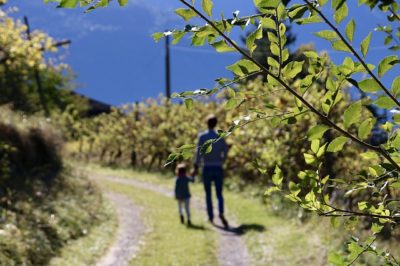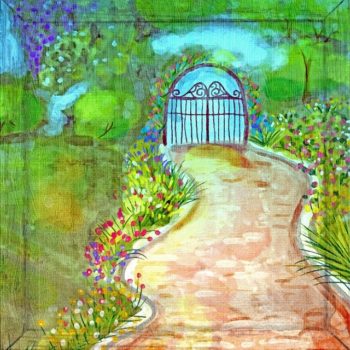by Sudeepta Sanyal
Sudeepta’s Solvitur Ambulando, a Latin phrase which translates to ‘It is solved by walking,’ is an endearing tale of how a father seeks solace in his evening walks, and his daughter’s understanding of it. The evening walk becomes a family heirloom.
‘It is solved by walking’ my father often said, sitting in the corner of the study, holding his guitar against his big panda chest, a cigarette hanging loosely from his lips. He tried to nudge me to go on walks with him. But I was a snotty fourteen-year-old, and like most fourteen-year-olds, thought that I knew everything that there was to know and elders were just a bore. I sat at home watching Cartoon Network and followed the adventures of Jonny Quest, while my father would step out for his walk at 5 pm every day. After his nap, before his tea, come what may, the Major was on his way.
Nothing would keep him back. The day his business shut down, the day he had that fight with his brother, the day he got elected to be the cooperative housing society’s chairman, the day the twin towers crumbled – at 5 pm, he slipped on his shoes and unlatched the gate. The tinkling of the chime told us that the Major was already out of the door.
One day, long before the quest of being cool had completely incapacitated my zest for life, I did give in to his prodding and go along on a walk. We passed by familiar lanes, newer houses, older homes resting under boughs of trees. Street dogs walked beside him, as if he were the Pied Piper, and we stopped by at multiple places to talk to neighbours sitting in their balconies. ‘Your daughter, Sanyal? She has your eyes/smile/nose,’ came affable greetings while he doled out awkward grins. We went along the boulevard fringed by the gulmohar tree and the guava groves. My father bent down to pick up a fruit. ‘This will ripen by tomorrow.’ He threw it in the air, towards me. I caught the green orb and slipped it into the front pocket of my frock. The birds whistled their homecoming symphony, and the sun inched slowly towards the horizon, staining the sky the colour of rohu.
We reached the lake in a sprint, using lanes that I never knew existed. That is where he allowed me to rest. But only for a while. Before I knew it, we were joined by Bhatti Uncle, who walked even faster. We marched along in a file on the periphery of the Dhakuria Lake: Bhatti Uncle with his candy floss turban, my father with his maroon shorts, and me trailing behind them, gasping for breath, imagining my lips going purple. We walked past the rowers who were practising for the next season, the laughing club, who threw their head back to laugh out to/at the universe, and the dog walkers, the least interesting of the lot. The dogs looked bored; their walkers were cadavers. Bhatti Uncle zoomed past them. ‘Sanyal, take your kids swimming. It’s an essential skill. I put Happy in a swimming class in her 8th only’. Father nodded, turning back to look at me. The thought of splashing around in a pool with my brother and his Star Trek stories for company made me shudder. I hoped my father was not serious about it. (And even if he was, could we afford it?)
That night I slept with a slight fever and the next morning Mother told him not to take me on his walks. ‘The child has no immunity. Those doctors who put her on a diet of antibiotics as a child are to be blamed.’ When I look back, I remember that I rather enjoyed the walk, except the time Bhatti Uncle pulled my cheeks to say goodbye.
Baba’s walks lasted for an hour. Sometimes he was handed grocery lists by Mother, which he didn’t like too much. ‘Why can’t I come home and then go to the market?’ ‘Because it will be too late, the shops will close.’ ‘I don’t like carrying the bag with me, how does one jog with a bag?’ ‘Bear with me Major Saheb. Or hire me a help who will do all this marketing.’ Mother’s eyes sparkled with mirth. We never hired help; we couldn’t afford help. Father had lost all his money in the business that he had started with his brothers. It all went down and never came back.
In the last two years of my stay at home, walks became imperative for him. I often saw Mother suggesting a walk to him. Baba had started spending more hours in his study, surrounding himself with old records and the comfort of cigarette smoke. He played his guitar less and watched the news with a pessimist’s gauge, almost anticipating something terrible to occur. We didn’t know how but my father’s descent to sadness had begun. He hid during the day in dark spaces and spent the evening with Neil Diamond and the blues.
It was in my second year when Baba got a heart attack. I reached the hospital late into the night. I saw his handsome face against the grey of the hospital sheets, his big panda chest surrounded by pipes and beeping machines, and felt a nothingness take over me. His ample forehead and his soft brown curls looked perfectly rested against the pillow as if he was enjoying a quiet sleep. The doctors fussed around him and spoke to us in muted tones. He had had a stroke; his body was not responding; they were pumping oxygen to his brain with the help of a machine; they can shift him…I didn’t hear much of what they said, because they repeated the same thing every day with different jargon. All I could say was ‘How could this happen? He went for a walk every day’.
I came to the hospital every day, armed with books and paperwork, to read about the benefits of a walk. I would make notes, read them out to Baba while he slept a dreamless sleep. Some days I imagined a hint of a smile, some days he looked sombre. While I found solace in the effects of walking on neurons, the heart muscles, and the insulin levels in our bodies, Baba sank deeper into his darkness. After a week, there was no improvement.
On the eighth day, I went for a walk tracing Baba’s usual route. Past the old homes and the new ones, to the banks of the lake, past the rowers and laughing club members. I sat and watched the sun slowly climb down. A cow mooed and gulls flew across the lake, and at that moment, just for that moment, the evening seemed beautiful, and life almost felt hopeful. That was before the gnawing feeling came back. ‘How could this happen, he is only 52. He is only 52. He is only 52.’
We let go of him that night. I couldn’t bear to be in our house without him, so I made my way back to my dorm. On a bus, then a train. Nothing made it close to alright in the next few years. But on some evenings, I tied my laces and stepped out for a walk in my neighbourhood, far far away from home. With the birds and the leaves, the crickets and the trees, the blooms and Neil Diamond for company. The evening walk became a family heirloom.
Sudeepta Sanyal writes her slow travel stories at Moonlitekingdom and runs a boutique travel company The Blueberry Trails. She lives between Goa and Mumbai. She is a Dumpukht 2019 alumni.






